
Honduras, officially the Republic of Honduras, is a country in Central America. In the past, it was sometimes referred to as "Spanish Honduras" to differentiate it from British Honduras, which later became modern-day Belize. The republic of Honduras is bordered to the west by Guatemala, to the southwest by El Salvador, to the southeast by Nicaragua, to the south by the Pacific Ocean at the Gulf of Fonseca, and to the north by the Gulf of Honduras, a large inlet of the Caribbean Sea.
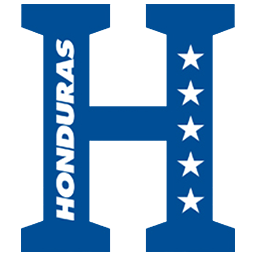
The Honduras national football team nicknamed Los Catrachos, La Bicolor or La H, is governed by the Federación Nacional Autónoma de Fútbol de Honduras (FENAFUTH). To date, the team has qualified three times for the FIFA World Cup, in 1982, 2010 and 2014.
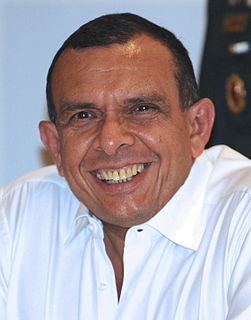
Porfirio Lobo Sosa, known as Pepe Lobo, is a Honduran politician and agricultural landowner who served as President of Honduras from 2010 to 2014. A member of the conservative National Party and a former deputy in the National Congress of Honduras from 1990, he was president of the National Congress of Honduras from 2002 to 2006. He came second to Manuel Zelaya with 46% of the vote in the 2005 general election. After the military ousted Zelaya in a coup d'état, Lobo was elected president in the 2009 presidential election and took office on 27 January 2010.
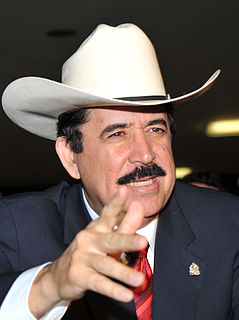
José Manuel Zelaya Rosales is a Honduran politician who was President of Honduras from 27 January 2006 until 28 June 2009. He is the eldest son of a wealthy businessman, and inherited his father's nickname "Mel". Before entering politics he was involved in his family's logging and timber businesses.
This page is about a Spanish surname. For the similar Portuguese surname, see Coelho.
Víctor Arturo Coello Paz is a Honduran footballer who plays as goalkeeper for Juticalpa in the Honduran Second Division.
Augusto Constancio Coello Estévez was a Honduran writer. Coello became a deputy in the Honduras National Congress in 1904. He was director of various newspapers, El Imparcial, En Marcha and Pro-Patria in Honduras and La Prensa Libre, La República, El Diario, El Pabellón Rojo y Blanco in Costa Rica. He wrote the lyrics for the National Anthem of Honduras in 1915 and wrote two books, El tratado de 1843 con los indios moscos (1923) and Canto a la bandera (1934).
Renán Almendárez Coello, known as El Cucuy De La Mañana, is an American radio personality heard from 10.00 a.m. to 2:00 p.m. on KSSE La Suavecita 107.1 FM, Los Angeles, California.
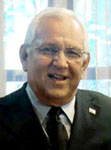
Roberto Micheletti Baín is a Honduran politician who served as the interim de facto president of Honduras from June 28, 2009 to January 27, 2010 as a result of the 2009 Honduran coup d'état. The Honduran military ousted the President, and the National Congress read a letter of resignation, which was refuted two minutes later by Zelaya in conversation with CNN en Español; days later, the coup-plotters claimed that the Supreme Court had ordered to forcefully detain President Manuel Zelaya because "he was violating the Honduran constitution"; Zelaya was exiled rather than arrested. Micheletti, constitutionally next in line for the presidency, was sworn in as president by the National Congress a few hours after Zelaya was sent into exile by the Honduran military. He was not acknowledged as de jure president by any government or international organization. The 2009 General Election took place as planned in November and elected Porfirio Lobo Sosa to succeed Micheletti.
The Horcones Massacre was a series of killings centered on the Los Horcones ranch in the department of Olancho, Honduras, in June 1975, in which up to 15 religious leaders, campesinos, and students were killed by the US-trained and -funded Honduran military.
Diego Dávila Coello y Pacheco, 1st Marquis of Navamorcuende, 17th Lord of Cardiel, El Bodón, Montalvo, El Hito and of Villar de Cañas was a Spanish soldier and colonial administrator who served as Royal Governor of Chile from March 19, 1667 to February 18, 1670.
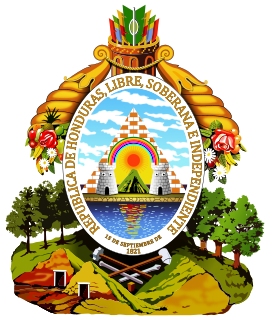
The 2009 Honduran constitutional crisis was a political dispute over plans to either rewrite the Constitution of Honduras or write a new one.

The Political Constitution of the Republic of Honduras was approved on 11 January 1982, published on 20 January 1982, amended by the National Congress of Honduras 26 times from 1984 to 2005, and 10 interpretations by Congress were made from 1982 to 2005. It is Honduras' twelfth constitution since independence in 1838. Previous charters were adopted in 1839, 1848, 1865, 1873, 1880, 1894, 1906, 1924, 1936, 1957 and 1965.
The 2009 Honduran constitutional crisis was a political confrontation concerning the events that led to, included, and followed the 2009 Honduran coup d'état and the political breakdown associated with it. The coup was repudiated around the globe, but Roberto Micheletti, head of the government installed after the coup, has claimed that the Honduran Supreme Court ordered the detention of Manuel Zelaya, deposed President of Honduras, and that the following succession was constitutionally valid.

The 2009 Honduran coup d'état, part of the 2009 Honduran constitutional crisis, occurred when the Honduran Army on June 28, 2009 followed orders from the Honduran Supreme Court to oust President Manuel Zelaya and send him into exile. Zelaya had attempted to schedule a non-binding poll on holding a referendum on convening a constituent assembly to rewrite the constitution. Zelaya refused to comply with court orders to cease, and the Honduran Supreme Court issued a secret warrant for his arrest dated 26 June. Two days later, Honduran soldiers stormed the president's house in the middle of the night and detained him, forestalling the poll. Instead of bringing him to trial, the army put him on a military aeroplane and flew him to Costa Rica. Later that day, after the reading of a resignation letter of disputed authenticity, the Honduran Congress voted to remove Zelaya from office, and appointed Speaker of Congress Roberto Micheletti, his constitutional successor, to replace him.
Guaymuras dialogue – Tegucigalpa/San José accord is a diplomatic agreement between two rival political factions in Honduras during the 2009 Honduran constitutional crisis. Representatives from the de facto Micheletti government and deposed President Manuel Zelaya reached the agreement after several weeks of diplomatic dialogue in late 2009.
The cuarta urna or fourth ballot box referendum was a plan by Honduran president Manuel Zelaya to run a non-binding referendum to consult the public regarding the administration of a second, binding referendum to convoke a constitutional assembly. The referendum was planned to run concurrently with the November 2009 presidential, congressional, and mayoral elections. Some Hondurans opposed the plan, including many politicians from the two largest parties. When Zelaya pushed ahead with plans for this referendum on whether to include a fourth ballot box, the Supreme Court issued a warrant for his arrest and the army expelled him from the country in a June 28 coup d'etat, precipitating the 2009 Honduran constitutional crisis.

Juan Orlando Hernández Alvarado, often known as JOH, is the fifty-fifth and current president of Honduras, who assumed office on January 27, 2014, after winning the 2013 Honduran general election. He began his second presidential term on January 27, 2018.

Tegucigalpa, colloquially referred to as Téguz, is the capital and largest city of Honduras along with its twin sister, Comayagüela.










